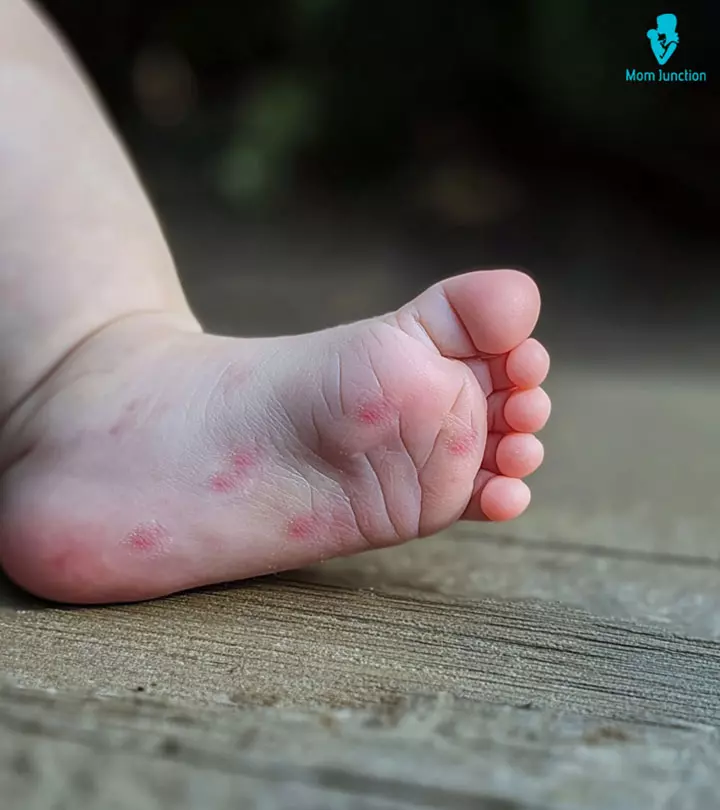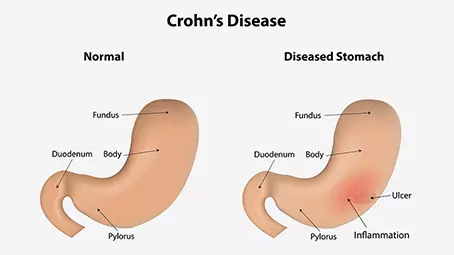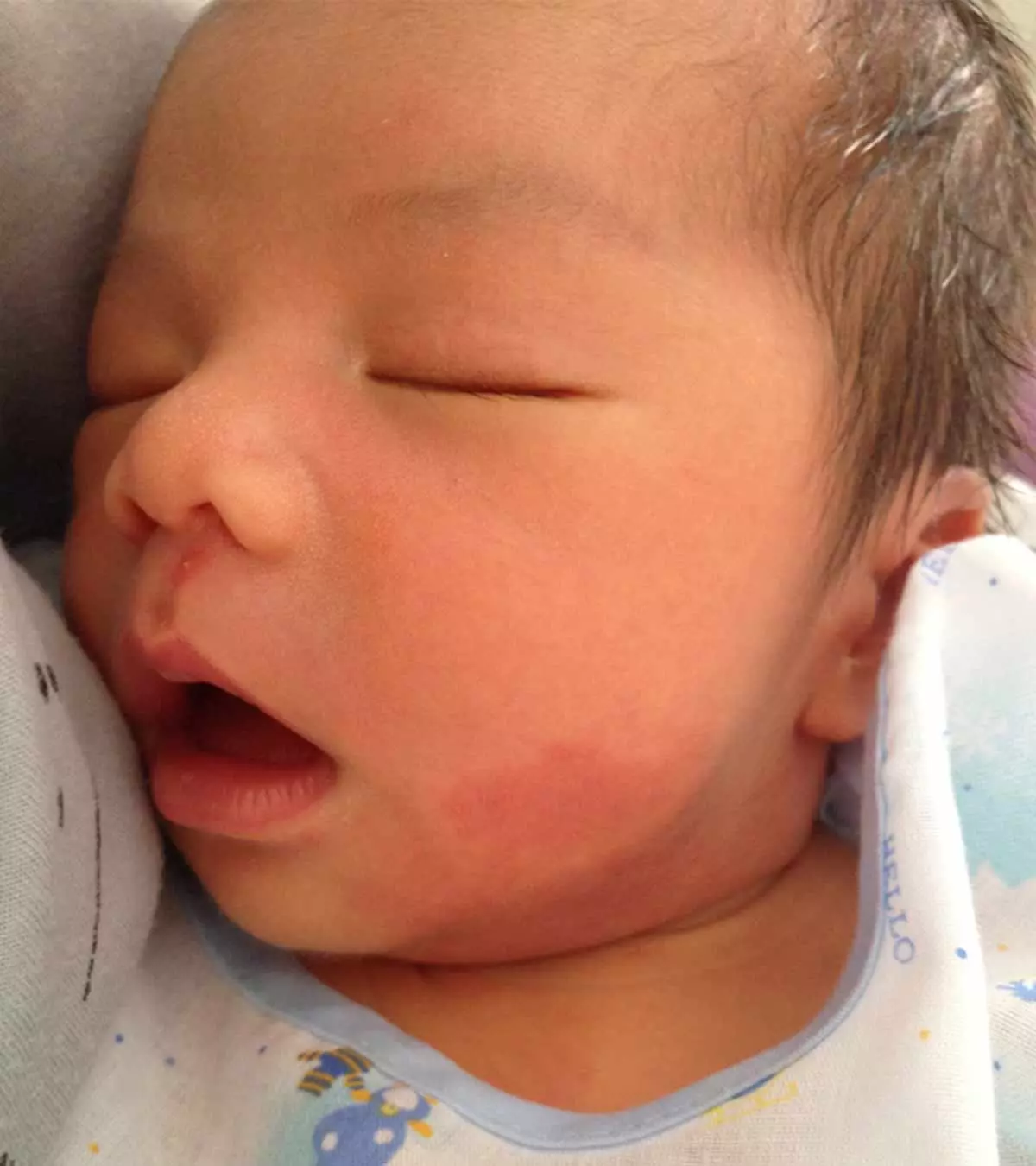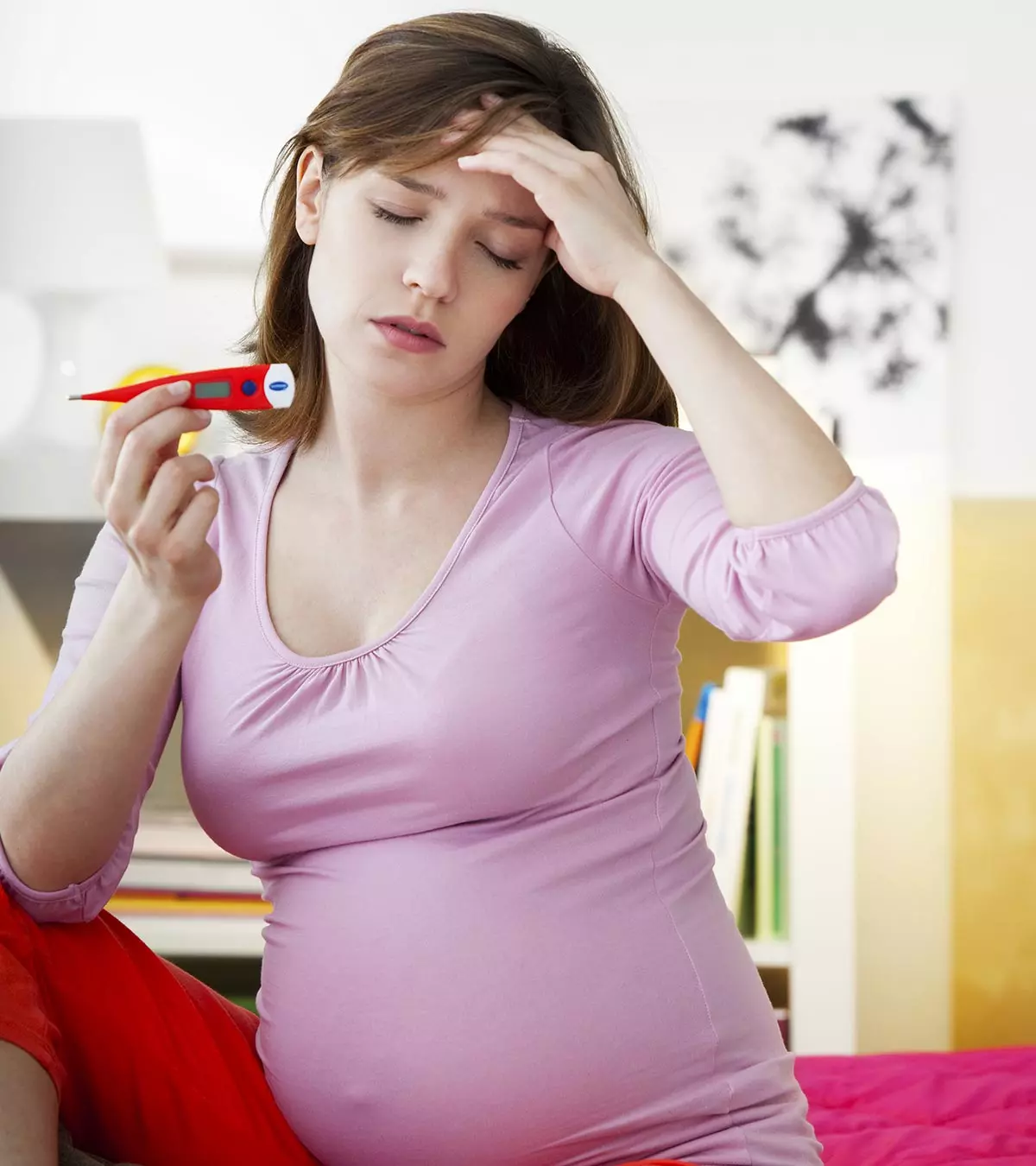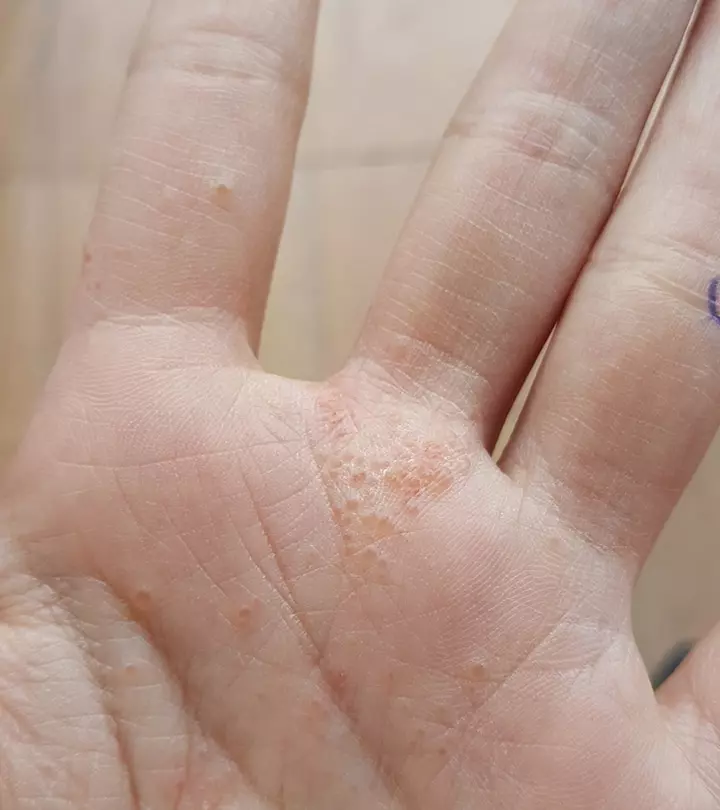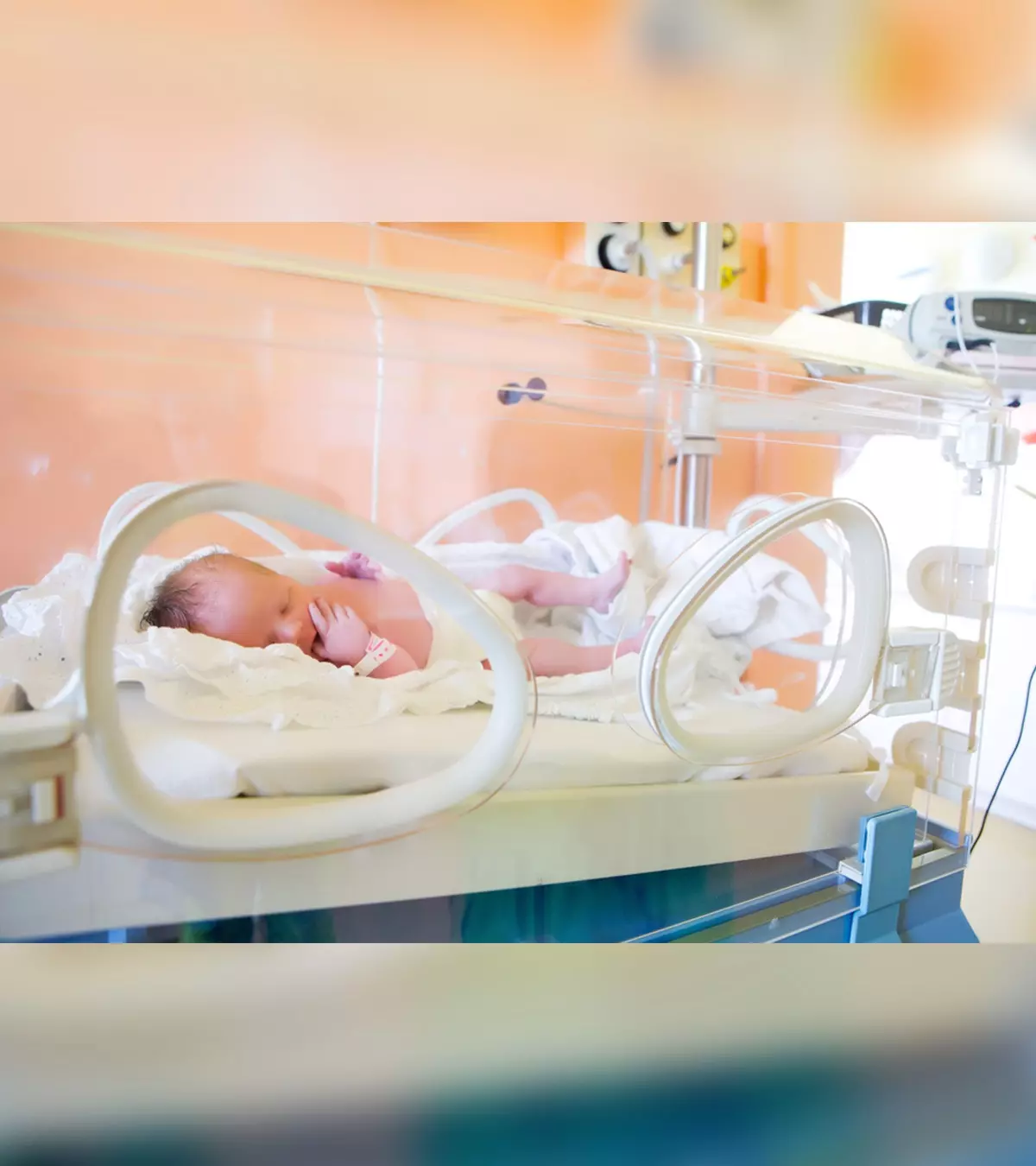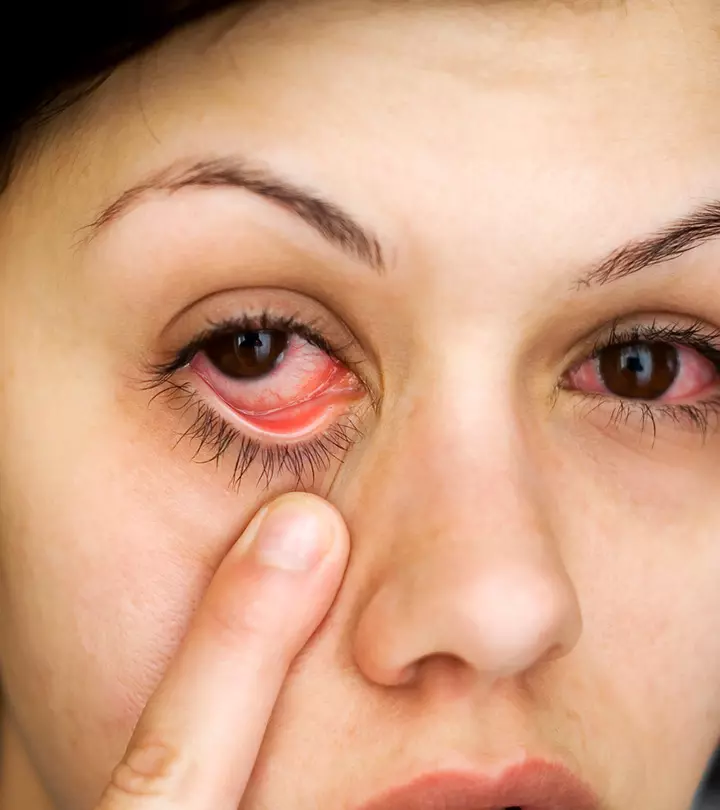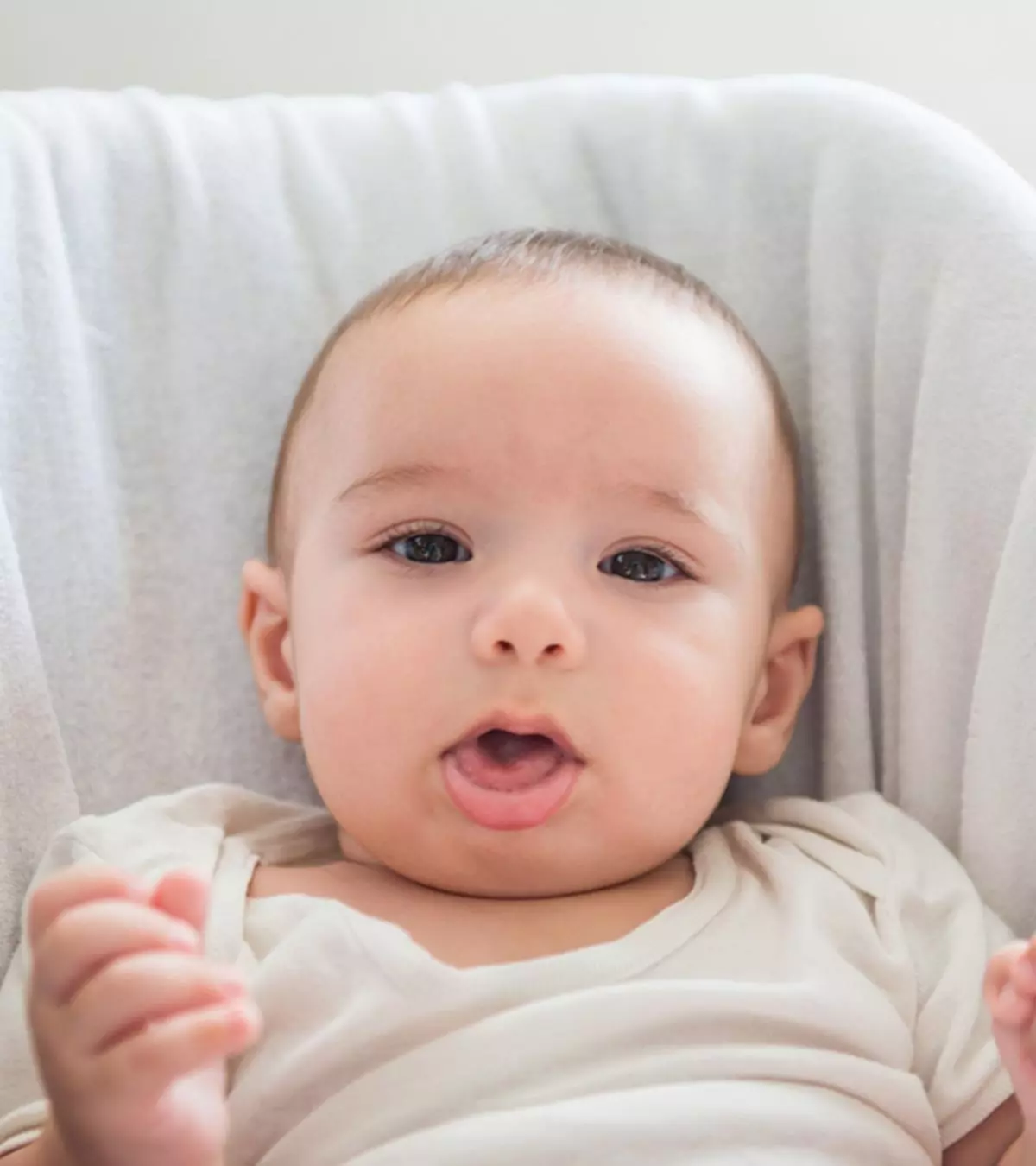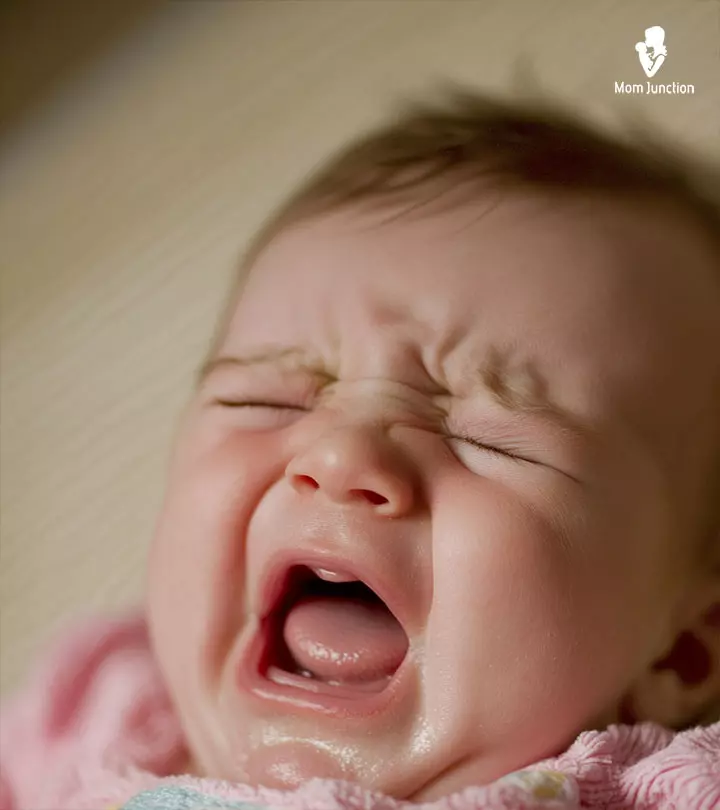
Image: Midjourney/ MomJunction Design Team
Hoarse voice in babies can be due to various reasons ranging from overuse of vocal cords to viral infections. Hoarseness is a condition that makes the voice sound breathy, raspy, rough, or strained. The common cold is the most common cause of hoarseness in babies (1). Babies who cry a lot may also experience hoarseness due to overuse of vocal cords. Although some people may use dysphonia and hoarseness interchangeably, these are different conditions. Dysphonia involves issues with voice production, resulting in poor voice quality and affecting communication skills. In comparison, hoarseness is a rough voice (2). Read on to know the causes, treatment, and prevention of hoarse voices in babies.
Key Pointers
- Hoarse voice in babies can be concerning for parents. However, it is a benign condition that can occur for several reasons, such as the common cold and inflammation of the larynx (laryngitis).
- In rare cases, abnormalities in the airways can cause hoarseness in babies.
- Timely treatment based on the cause and duration of hoarseness, the baby’s age, and health history can help mitigate the risk of complications.
- Parents may try natural remedies under pediatric guidance to prevent or reduce the hoarseness of the baby’s voice.
What Causes A Hoarse Voice In Babies?
Dr. Paul Patterson, a board-certified pediatrician and expert in developmental and behavioral pediatrics from Bethesda, Maryland, says, “Everyone has differences in vocal qualities, and some voices may naturally be more hoarse than others, not necessarily indicating a problem. There are also various reasons for a hoarse vocal quality in babies. Crying and screaming during times of distress can cause some hoarseness but typically is present only for two to three days.”
According to a report from the American Academy of Pediatrics, most cases of hoarseness in children are harmless, can be reversed, and tend to resolve on their own (3). The most common cause of hoarseness is cold. Sometimes, it could be cold, runny eyes, and cough in babies (4). However, hoarseness could also be due to many other reasons, such as:
- Laryngomalacia: Babies with laryngomalacia have noisy breathing because of a soft, floppy voice box. This occurs because the tissue above their Vocal cordsiThe two bands of elastic muscle tissue in your voice box that vibrate to produce your voice. is softer than normal, which can partially block their airway. This condition is usually not dangerous and gets better by around 18-20 months of age (5). In some case reports, respiratory stridor is noted as the first symptom (6).
- Upper respiratory tract infections: Several viral and a couple of bacterial infections can result in laryngitis (an inflamed LarynxiThe voice box in your throat that contains your vocal cords and helps you speak, breathe, and protect your airway when swallowing. ) The inflammation leads to swelling of the vocal cords that lie within the larynx, and this causes a hoarse voice (7).
The parainfluenza virus is another virus that can cause a hoarse voice, barking cough, and a specific symptom called stridor (8). This collection of symptoms with an increased body temperature, mild fever, and runny nose is called croup (7). Stridor is an audible, high-pitched, inspiratory whistling noise caused by an inflamed larynx, trachea, and upper bronchus. Once you hear stridor, it is important that your baby is seen by a pediatrician (9). Croup can range from mild to severe and may require inpatient observation and treatment depending on its severity. Other such conditions that could lead to a hoarse voice are laryngitis (swelling of the larynx) and pharyngitis (swelling of the pharynx) (10) (11). - Excessive crying: Colicky babies tend to cry more than the others, and strain their larynx, which may lead to a hoarse voice.

- Vocal nodule: Overuse of the vocal cords can lead to nodules and swelling on the edge of the vocal cords (12). These nodules and swelling are benign but can cause chronic hoarseness. Older infants and toddlers experiment with their voice, and often these experiments are noisy. The hoarseness in this case tends to be worse in the evenings after a day of heavy use.
- Laryngopharyngeal reflux: Frequent acid reflux to the larynx can irritate the vocal cords nodules (13). Babies with gastroesophageal reflux can have a hoarse voice. However, unlike in vocal cord nodules, the hoarseness from laryngopharyngeal or silent reflux in babies tends to be worse in the morning.
- Spasmodic croup/allergies: An allergy can cause excess secretion of mucus in the airway from the nose to the BronchiolesiThe tiny branches of airways in your lungs that carry air to and from the air sacs. . In some children, a condition called spasmodic croup occurs. In this case, it is postulated that due to allergens, and not infections, the upper airway becomes inflamed, causing recurrent hoarseness and stridor (14).
- Vocal cord lesions: Vocal cord lesions can be benign like PapillomasiSmall, wart-like, benign or non-cancerous growths. caused by human papilloma virus, which leads to stridor and hoarseness. This may require surgical removal by an ENT physician. PolypsiSoft, swollen growths that can form in various parts of the body. can also grow on the vocal cord tissue leading to hoarseness (15).
- Irritants: Smoke from automobiles and cigarettes can also cause vocal cord irritation (16). Chemicals and air pollution can also exhibit the same finding of hoarseness.
In rare cases, a baby may be born with abnormalities in the airway that can cause hoarseness.
 Did you know?
Did you know?When To See A Doctor?
Dr. Patterson adds, “The key is listening for a persistent hoarse vocal quality when it is lasting longer than a week and may be accompanied with behaviors that cause muscular tension (for example, excessive amount and time of screaming and crying or snoring at night time). Check in with a pediatrician if a child has an illness or fever or is acting differently accompanying the hoarse voice.”
It is good to see a doctor if, along with hoarseness, the baby (13) (17):
- Has a weak voice that does not seem to get better, or the voice stays hoarse for several weeks.
- Makes no sound while crying or makes a sharp, abnormal sound while crying.
- Has a sore throat that lasts a long time.
- Coughs continuously, and it does not seem to get better.
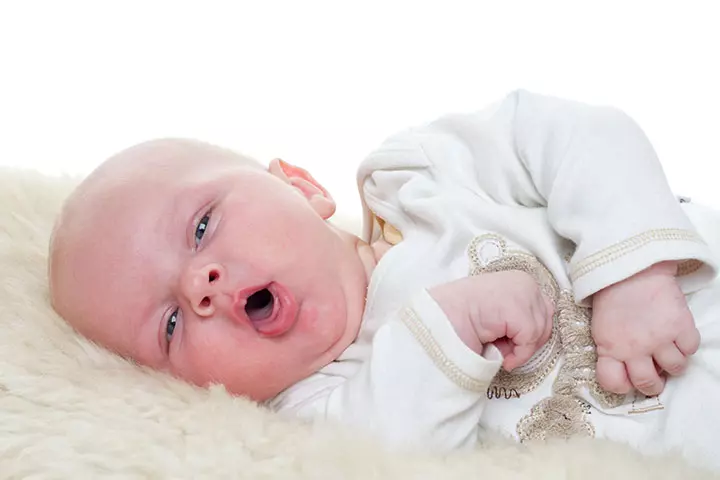
- Has trouble while breathing and makes wheezing sounds while breathing.
- Loses their appetite or has a problem while swallowing.
Besides these, hoarseness with a baby sore throat that lasts a long time is another condition when prompt medical examination is necessary.
The doctor will diagnose the underlying cause of hoarseness by inspecting the baby’s throat. If needed, additional tests such as a laryngoscopyiA medical procedure to look at the larynx using a special scope. , MRI scan, or biopsyiA medical test where a small piece of tissue is removed and examined under a microscope to check for disease. may be performed (18). Blood and sputum tests may be needed for diagnosing infections. Once the diagnosis is confirmed, the doctor will prescribe the necessary course of treatment.
 Research finds
Research findsHow Is Hoarse Voice In Babies Treated?

The treatment of hoarse voice depends on its cause, duration of hoarseness, the baby’s age, and health history at large, which the doctor is likely to ask you during a consultation. Depending on the symptoms and health in general, you might be sent to an ENT specialist (otolaryngologist).
An otolaryngologist will view the vocal folds to get a proper understanding of the probable cause of hoarseness. Treatment is suggested once a confirmed diagnosis is made (2). However, the use of antibiotics for treating hoarseness is not recommended (19).
Hoarseness of voice can be highly irritating for the baby. You may alleviate the discomfort, before or during the treatment, with the use of natural remedies. But as you plan to do so, check with your doctor about the efficacy and safety of the remedy.
 Things to know
Things to knowHome Care For Hoarse Voice
Here is what you can do to prevent or reduce the hoarseness of a baby’s voice (2) (20):
- Keep the baby hydrated: Increase the number of breastfeeding sessions or give more water to sip frequently if the baby is older than six months.
- Use a cool-mist humidifier: A humidifier pumps water vapor into the ambient air so that it does not dry the throat and airways. The use of humidifiers during throat problems may prevent drying up of the vocal cords. Only use a cool-mist humidifier and not a steam/hot-mist humidifier, which increases the risk of burns.
- Avoid allergens and irritants: If you know the baby has allergies, keep them away from potential allergens, such as pollen, pet fur, pet dander, strong fragrances, and dust. Babies and toddlers should be kept away from pollution, too. Do not let anyone in the home smoke, and avoid going to places where the baby will be exposed to tobacco smoke.
- Control colic and restrict vocal cord overuse: If the baby cries a lot, then try swaddling and relaxing them with a lullaby. Older toddlers may be taught to speak softly until the vocal cord gets better. You can offer incentives to the toddler for being silent. You may also try to keep the toddler occupied with games that require silent play.
- Maintain good hygiene and vaccinate: Babies and toddlers should wash hands after outdoor play. Keep the baby’s surroundings clean. If someone has a cold in the family, then they must keep away from the baby. Vaccinating the baby and the family is also essential to avoid infections such as influenza.

 Quick tip
Quick tipFrequently Asked Questions
1. Does RSV cause hoarseness?
Respiratory syncytial virus or RSV can cause lower respiratory tract infections, leading to pneumonia-like symptoms, such as a barking cough or hoarseness (23).
2. Can mucus in the throat cause hoarseness?
Postnasal dripiWhen excess mucus from your nose drips down the back of your throat. due to cold, allergy, or smoke may cause the mucus to irritate the throat, leading to hoarseness (24).
3. Can thrush cause hoarseness in babies?
Oral thrush usually doesn’t cause a hoarse voice. However, in some cases, thrush may spread to other regions, such as the larynx, causing hoarseness(25).
4. How long does it take for hoarseness to go away?
Hoarse voice in babies can be caused due to several reasons. It is advised to consult a doctor or pediatrician to avoid any complications. Hoarseness in babies is usually treated by an ENT specialist who helps understand the condition better. You can try home remedies like keeping your baby hydrated and away from irritants and controlling their vocal cord usage to prevent hoarseness in their voice. A hoarse voice is seldom associated with any serious medical issues, and your baby will feel better with the help of proper treatment and care.
Infographic: Causes And Management Of Hoarse Voice In Babies
If it sounds like your baby is straining to speak and there is hoarseness, what could be the reasons and how can you help them? Check out this infographic for a quick read of:
- Causes of hoarse voice
- Home care measures
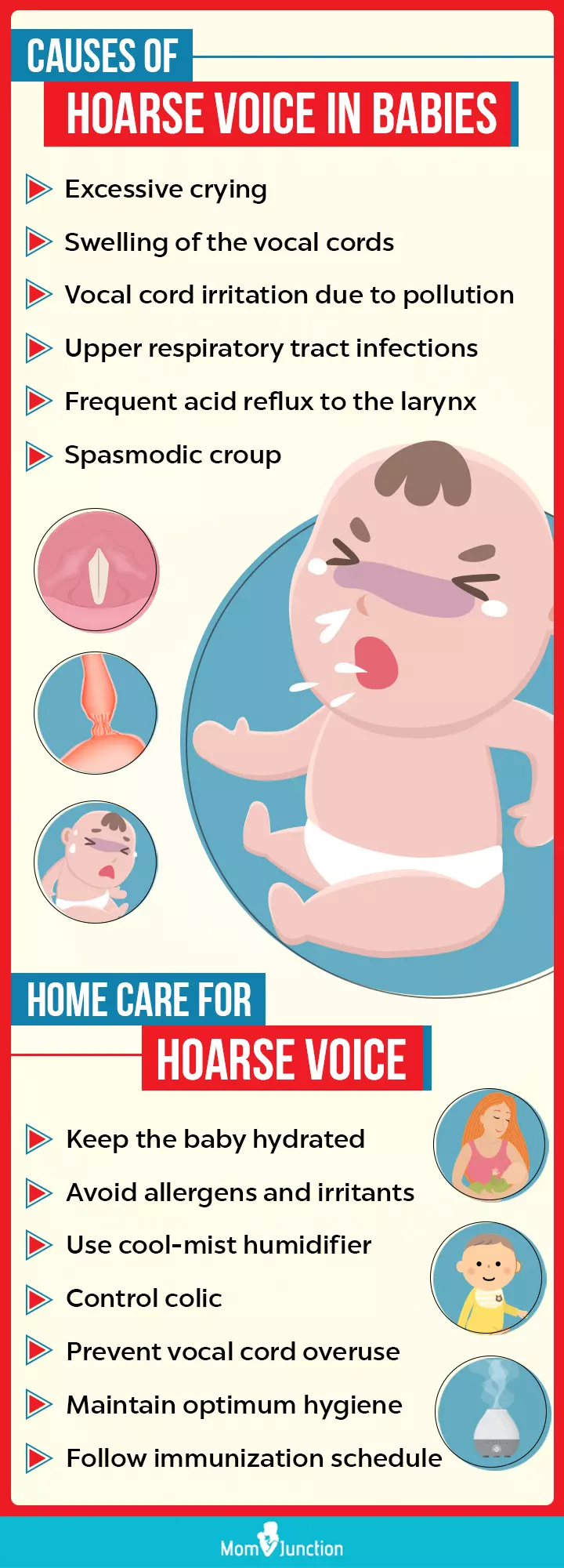
Illustration: Momjunction Design Team
Illustration: Causes of Baby’s Hoarse Voice Treatment And Home Remedies
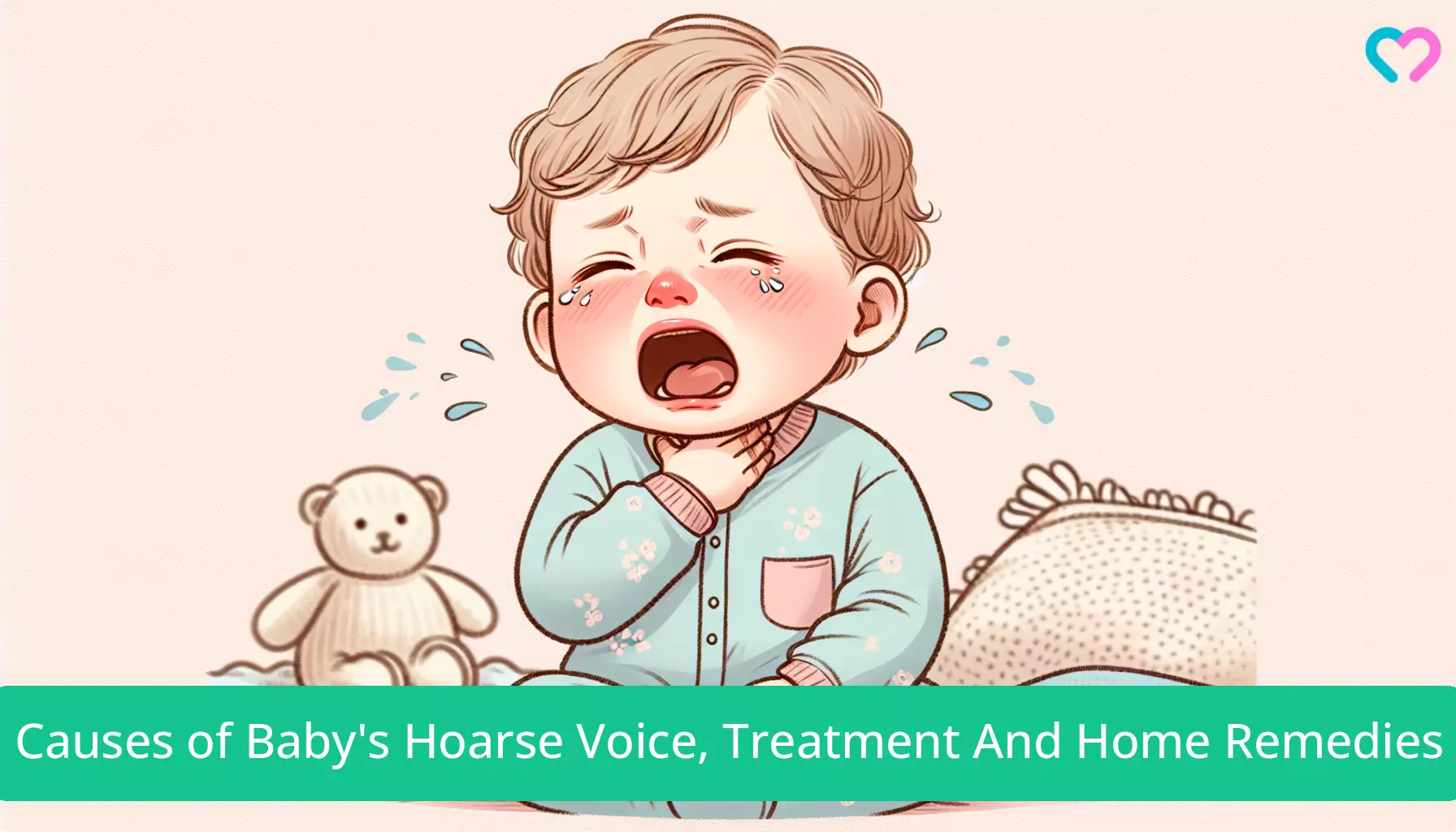
Image: Dall·E/MomJunction Design Team
Is laryngitis a concern for a 7-month-old? Watch this informative video to understand how to recognize and manage laryngitis in infants effectively.
References
- Hoarseness.
https://medlineplus.gov/ency/article/003054.htm - Seth R. Schwartz et al.; (2009); Clinical practice guideline: Hoarseness (Dysphonia).
https://pubmed.ncbi.nlm.nih.gov/19729111/ - Henry Adam; (2021); Hoarseness.
https://publications.aap.org/pediatriccare/article-abstract/doi/10.1542/aap.ppcqr.396085/1515/Hoarseness?redirectedFrom=fulltext - Colds.
https://www.healthychildren.org/English/tips-tools/symptom-checker/ - Laryngomalacia.
https://www.chop.edu/conditions-diseases/laryngomalacia - Melissa A.G. Avelino et al.; (2005); Management of laryngomalacia: experience with 22 cases.
https://www.sciencedirect.com/science/article/pii/S1808869415313318 - Croup in Young Children.
https://www.healthychildren.org/English/health-issues/conditions/chest-lungs/Pages/Croup-Treatment.aspx - Parainfluenza (Human Parainfluenza Viruses).
https://my.clevelandclinic.org/health/diseases/24522-parainfluenza - Stridor Versus Wheezing: When Noisy Breathing Is Something More.
https://www.hopkinsmedicine.org/health/conditions-and-diseases/stridor-versus-wheezing - Laryngitis.
https://www.nhs.uk/conditions/laryngitis/ - Pharyngitis – sore throat.
https://medlineplus.gov/ency/article/000655.htm - Voice disorders.
https://www.rch.org.au/kidsinfo/fact_sheets/voice_disorders/ - Hoarseness.
https://www.nidcd.nih.gov/health/hoarseness - Hoarseness.
https://health.uconn.edu/otolaryngology/areas-of-care/hoarseness/ - Hoarseness.
https://med.uth.edu/orl/2020/01/09/hoarseness/ - About Smoke and Health.
https://www.ourair.org/about-smoke-and-health/ - Hoarseness.
https://www.childrenscolorado.org/conditions-and-advice/conditions-and-symptoms/symptoms/hoarseness/?language=en - Diagnosing Hoarseness in Children.
https://nyulangone.org/conditions/hoarseness-in-children/diagnosis - Rudolf Reiter et al.; (2015); Hoarseness—Causes and Treatments.
https://pmc.ncbi.nlm.nih.gov/articles/PMC4458789/ - Hoarseness.
https://www.seattlechildrens.org/conditions/a-z/hoarseness/ - Yanyan Wang; (2022); Case Report: A Rare Cause of Stridor and Hoarseness in Infants—Congenital Laryngeal Web.
https://pmc.ncbi.nlm.nih.gov/articles/PMC9024097/ - Voice care: Sorting fact from fiction.
https://utswmed.org/medblog/vocal-cords-care-qa/ - RSV Symptoms and Diagnosis.
https://www.lung.org/lung-health-diseases/lung-disease-lookup/rsv/symptoms-diagnosis - Symptoms of laryngeal cancer.
https://www.cancerresearchuk.org/about-cancer/laryngeal-cancer/symptoms - Michael Taylor et al.; (2023); Oral Candidiasis.
https://www.ncbi.nlm.nih.gov/books/NBK545282/ - Hoarseness.
https://my.clevelandclinic.org/health/diseases/17105-hoarseness
Community Experiences
Join the conversation and become a part of our nurturing community! Share your stories, experiences, and insights to connect with fellow parents.
Read full bio of Dr. Garima Garg Seth
- Dr. Paul Patterson is the chief medical officer and co-founder at Pathfinder Health. A board-certified pediatrician and expert in Developmental and Behavioral Pediatrics, Dr. Patterson received his MD from Uniformed Services University of the Health Sciences. He is also a licensed professional engineer with a PhD in Electrical Engineering from The George Washington University.
 Dr. Paul Patterson is the chief medical officer and co-founder at Pathfinder Health. A board-certified pediatrician and expert in Developmental and Behavioral Pediatrics, Dr. Patterson received his MD from Uniformed Services University of the Health Sciences. He is also a licensed professional engineer with a PhD in Electrical Engineering from The George Washington University.
Dr. Paul Patterson is the chief medical officer and co-founder at Pathfinder Health. A board-certified pediatrician and expert in Developmental and Behavioral Pediatrics, Dr. Patterson received his MD from Uniformed Services University of the Health Sciences. He is also a licensed professional engineer with a PhD in Electrical Engineering from The George Washington University.
Read full bio of Rohit Garoo
Read full bio of Dr. Ritika Shah
Read full bio of Vidya Tadapatri













